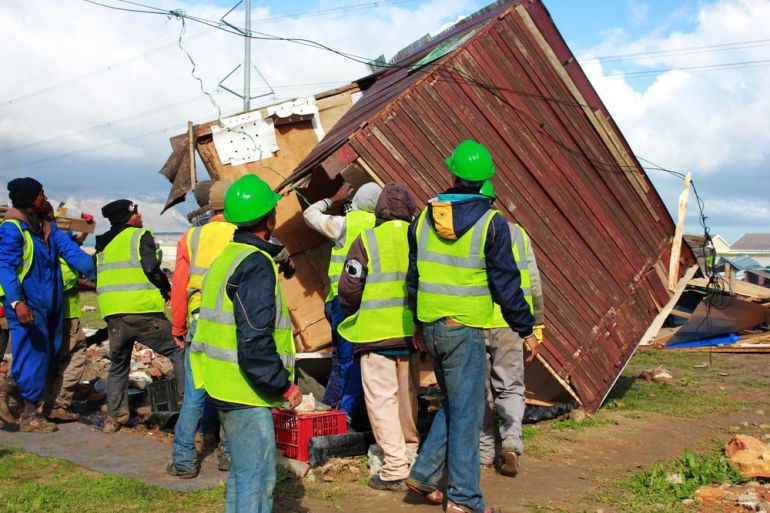In Pictures
In Pictures: Outrage over S Africa evictions
Eight hundred people were displaced from an informal settlement near Cape Town, in the middle of a cold winter.

Cape Town, South Africa – In the early hours of Monday morning, police officers swept through the Nomzamo settlement in Lwandle, around 40km outside Cape Town.
Images flooded the media of residents being brutally removed from their homes, rushing out with whatever belongings they could grab at the last minute.
In all, 223 illegally built homes were demolished and at least 800 people were displaced.
Violence erupted as police unleashed water cannons to push people out. In response, residents launched petrol bombs. That night, in the middle of a cold Cape winter, masses of people had no other option but to sleep on the wet roads. No steps were taken to provide alternative accommodation.
The residents of Nomzamo had occupied land that belongs to the South African Nation Roads Agency Limited (Sanral). In the 24 hours after their homes were destroyed, no representatives from the city, the province, or Sanral made an appearance to help them. They were lost on their own streets.
Little changed on Tuesday. The roads were littered with broken furniture, burning wood, and people hunting for any bit of shelter they could find. Near the destruction site, riot police stood, guarding contractors who toppled the already crumbling structures.
Lwandle’s people looked on, gazing as their homes were demolished. Kids ran around, while stunned parents stood motionless. By afternoon, they still did not know what would happen to them, and some became restless.
Women began singing and dancing in front of the police, stomping on sheets of corrugated iron from their former homes. The agitation grew, and police fired rubber bullets and tear gas into the crowd.
On Wednesday, Lindiwe Sisulu Sisulu, South Africa’s Human Settlements Minister, said the city of Cape Town and Sanral should have handled the situation better.
“What we saw in the media, the information we gathered from the community, reports we received from Sanral and statements from the city of Cape Town leaves us with many unanswered questions,” she said in a statement. “It is not possible that in the middle of a very cold Western Cape winter and rains and children writing exams, the whole community can be removed in brutal force. That concerns me as the minister of human settlement. We are a caring government.”
Eventually, it was announced that the city had given permission for Lwandle’s Community Hall to be used as a temporary shelter. But many were conflicted between whether to move there, or guard their few remaining possessions in the rubble.










